Why Don't I Hate Fabula Ultima?

Fabula Ultima's Celebration Kickstarter has passed one million euro in just over a week. That’s comparable to MCDM's campaigns, and nearly double Mothership's initial haul. As I write this, the game’s publication house is scrambling to lean in to their success. Three additional books, a line of adventure modules, an organized play league, an in-house actual play, and expansions to the development team are all slated for the next three years. The system is here to stay, and I've joined the growing hordes of Fabula-fanatics backing at its shamefully lavish highest tier.
I’ve played this system for a year and a half. It’s a chore to GM.
So why did I back it anyway?
For the Uninitiated
Fabula Ultima is a Ryuutama hack incorporating numerous modern design innovations - Clocks, Bonds, description-as-skills, abstracted inventory, freeform ‘Big Magic’, non-lethal combat stakes, and a titular Fate Point derivative - alongside genuinely tactical theater of the mind combat and a wonderfully intricate multiclass leveling system. Though its inspirations are broad, this is no hodgepodge heartbreaker - each mechanic is carefully chosen to evoke the gameplay and thematics of classic JRPGs.
I've GM'd eleven sessions of Fabula and played in two. In that time, I've never once played in accordance with the designer’s vision. That is not speculation - Ema is quite vocal on these matters.
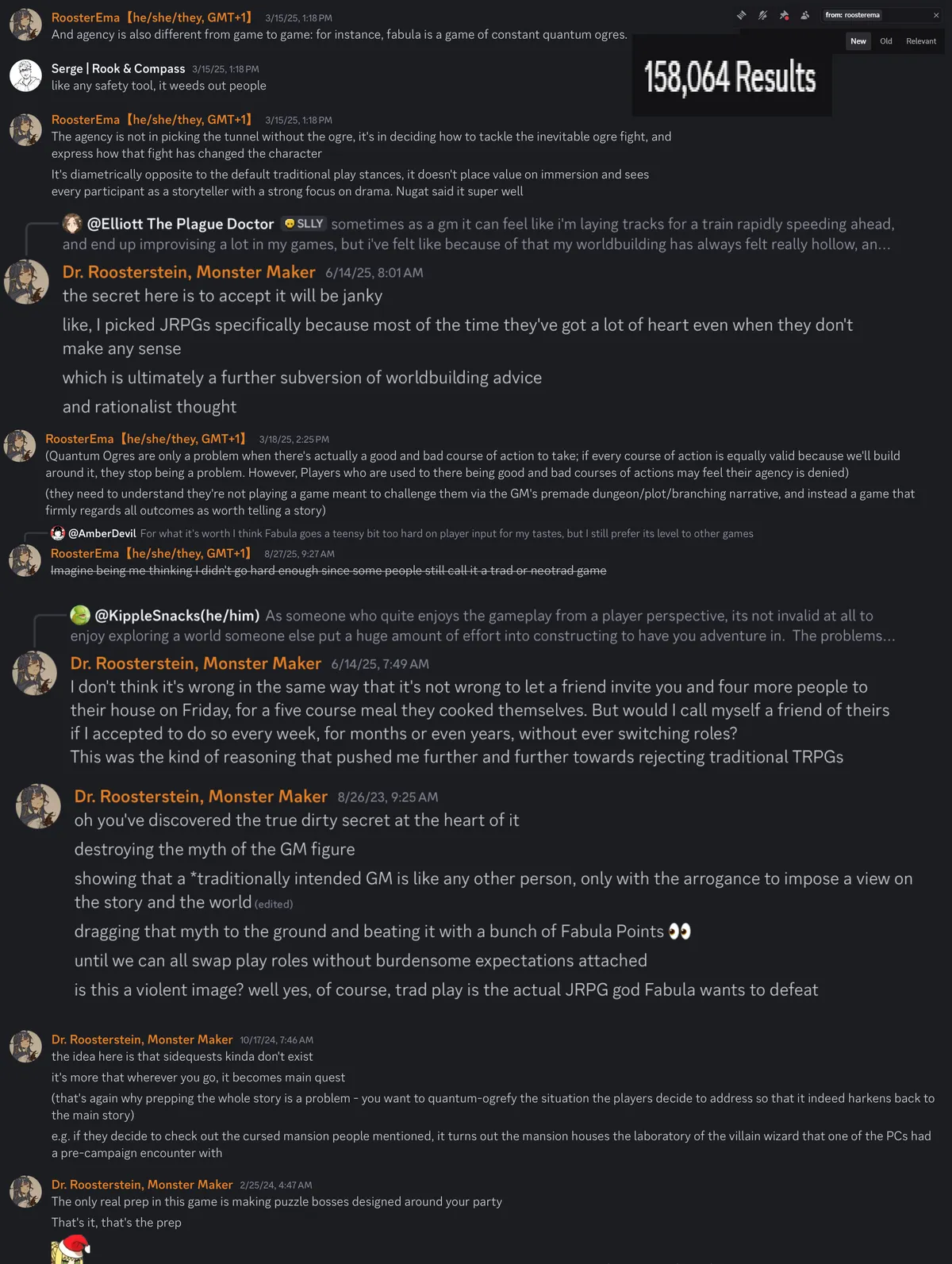
Fabula Ultima is a storygame in trad drag.
I can’t help but respect Ema for unintentionally pulling off the TTRPG bait-and-switch of the decade.1 Lord knows the principles outlined in these books will help weeby video game converts build more fulfilling sessions than I did at their age. Tricking players acclimated to passively experiencing a story into learning that, in this hobby, they’re personally responsible for that story’s quality is a laudable goal.
But I’ve dodged the question. Fabula is explicitly opposed to the Blorby play I adore. Why spend half a paycheck to go back for seconds?
How I was Seduced by this Foul Nitfol-Frotz Harlot
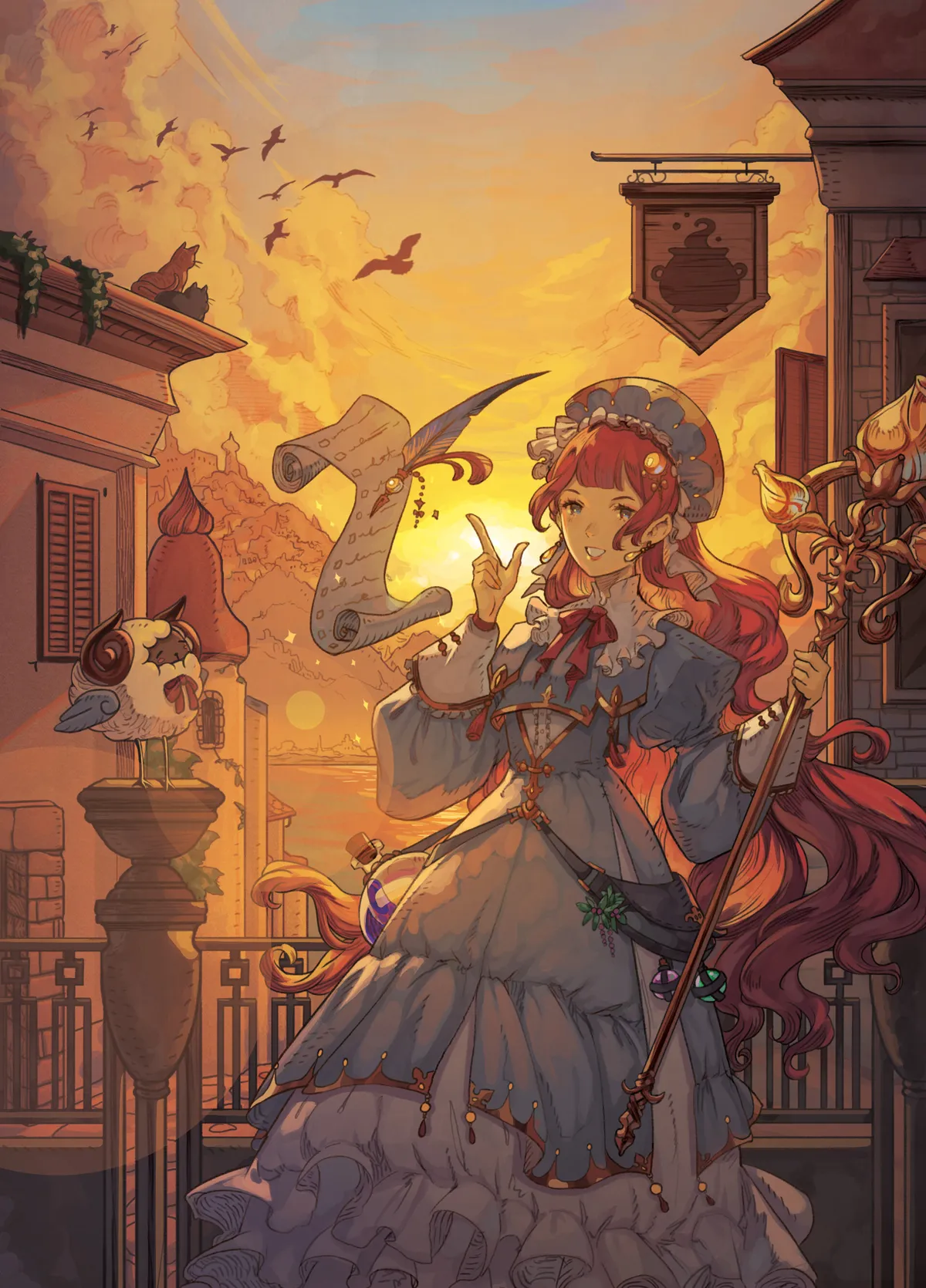
The Core Mechanic is Great
Four stats which scale by die size. Roll two dice against GM-set difficulty for each check, varying by task.
Pushing a boulder? Roll two of your might die.
Sprinting through a city street? Roll might & dexterity together.
The flexibility makes edge case tasks easy to represent. Extremely elegant.
Character Builds are an Underrated, Useful Compromise
Fabula Ultima boasts 15 core classes, 11 expansion classes, and 2 online 'Bonus' classes. One class ability can be gained or upgraded per level, to a maximum of 10 levels in any particular class, after which a capstone is selected from yet another diverse list. Players start at level 5 and are required to multiclass. Level ups occur roughly every other session, and numerical bloat has been thankfully kept to a minimum.
The breadth and freedom of character design on offer is unmatched. Selections are less about assembling combat combos (though those do exist - more commonly between party members than within an individual character) than selecting the gameplay pillars you'd prefer to interact with. The Wayfarer class, for example, contains abilities interacting almost exclusively overland travel.
In my perfect game all character advancement would be diegetic. Some nasty-ass table rolls would bless my party of classless hole people with… idk… a bale of hay, eleven dollars, and a brass polearm that dowses seed oil. We’d choke an angel to death with twine, then sell her meat to the roaches for shoe money. Six months later, one of us has ‘the worm curse’, another telekinetically controls wheat, and the rest sold their soul to the butterfly queen because the butterfly queen was hot.
That style of play requires a lot of trust. More than we should reasonably expect from strangers.
Players have to believe that the setting you’re creating will turn them into the kinds of people they find interesting. A conventional leveling system is an anchor to each player that promises, no matter what, that the future holds some sick-nasty stuff. Your character has a coolness floor, no matter what wild diegetic upgrades the future has in store. I’m okay with offering that coolness floor to facilitate buy-in.
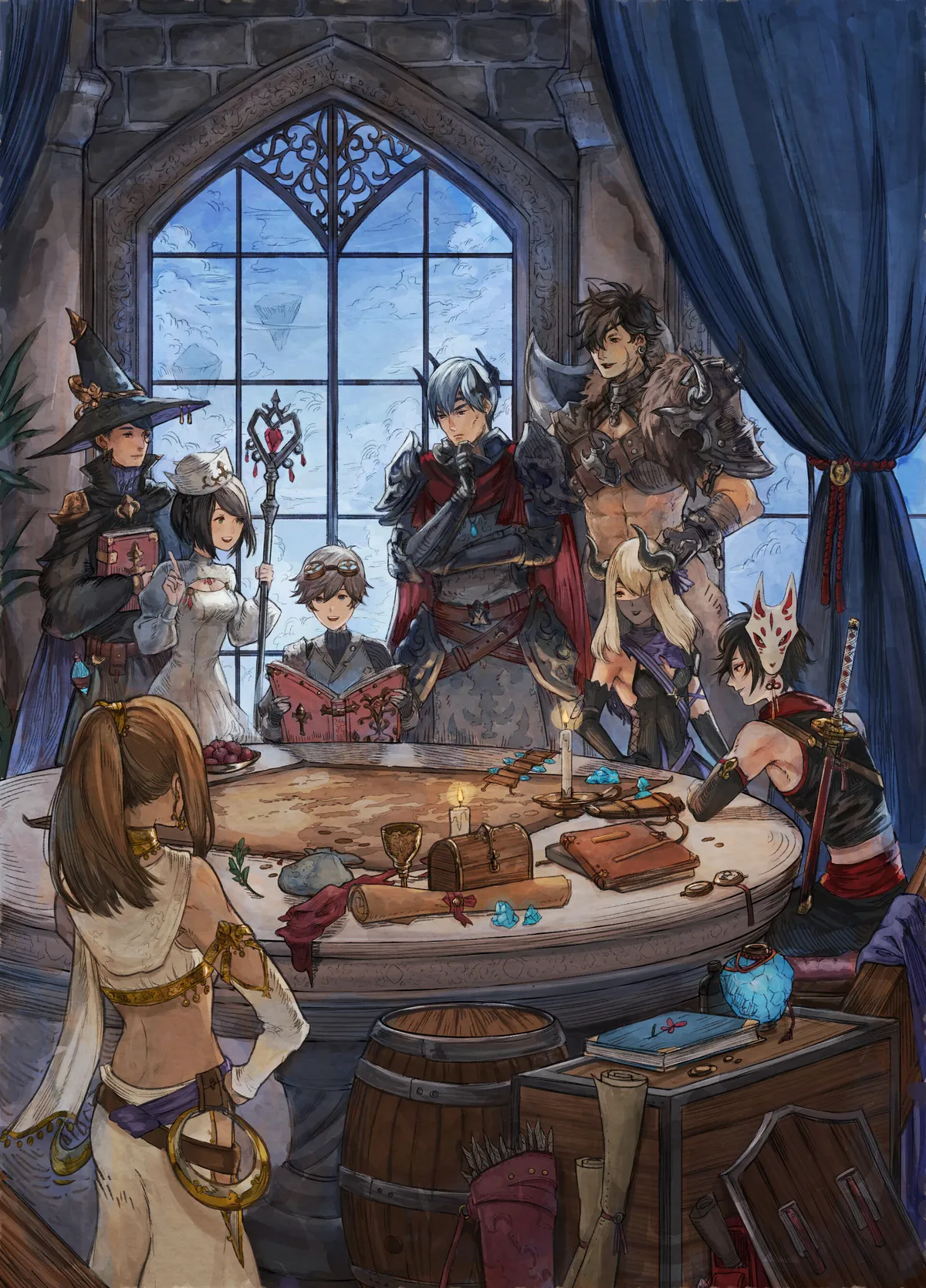
The Combat is Terrific
Ignoring relative positioning in combat is the key to running anime-ass combat scenes. Do you know how much fun it is to narrate how the villain picks up the tank and throws them through a stone wall off a standard attack roll? Do you know how much fun it is to listen to the tank make up the most asinine Advent Children bullshit to justify how they leap back into the action on their turn? You never have to ask the game’s permission to add visual dynamism to a scene, it's so freeing.
Systemically, JRPG combat remains a great minigame that all of my friends immediately grok. The system provides, if anything, too much instruction on how to build engaging versions of those classic encounters.2 I will never balance my combat encounters (sorry Ema), but I nonetheless like having a scale by which I can measure their relative difficulty - the tools don’t go to waste.
The Surrender / Sacrifice rules3 are also wonderful insurance; no matter how far the players get in over their head, TPKs can be substituted for whatever interesting consequences I want. The consequences of misplays in the combat minigame no longer spiral out into vast narrative disruption - solving the 'storytelling vs problem solving' dilemma that plagues so many similar systems.
It’s Beautiful, and I am weak
To address the elephant in the room - the art direction of BREAK!! is horny, ugly, and weird.4 If that’s your jam more power to you, but I flatly do not enjoy looking at that book. Even its great layout gets overwhelmed by a clown shoes color palette. Running a campaign requires you look at reference books a lot, and Fabula’s layout and art direction is world class.
I love drama. Real drama requires that your players treat your game seriously. Art communicates to players how seriously your game should be treated. Fabula’s art holds a deep reverence for the worlds it invites you to imagine.
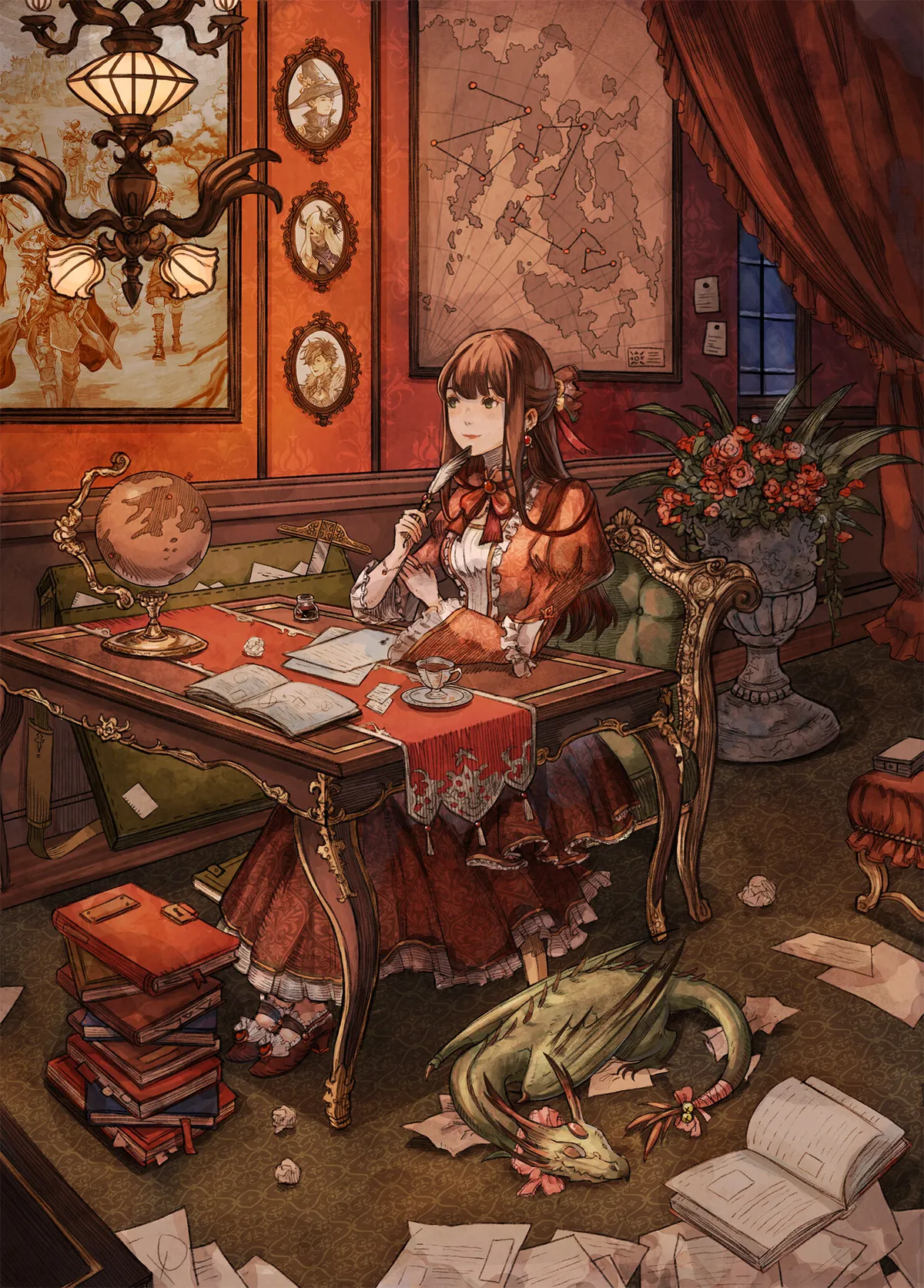
I Can Fix Her
Time for the stanky meat of this compliment sandwich.
These are the points of friction I encountered across 13 games. I believe all can be bent toward pleasing blorby curves, though I've yet to solve them all.

You're not my dad.
Fabula Points
Bad sign that I’m opening with the game’s titular mechanic, huh.
‘Fabula Ultima’ refers to the game’s two chief metacurrencies - Fabula points for the Heroes, and Ultima points for the Villains. The former is used as a narrative control benny that hedges against hoarding behaviours by granting XP on use. The latter allows Villains to auto-escape scenes.5
Fabula points cannot alter game stats and require GM/Player consent to alter preexisting aspects of the fiction (Ex, “Can that NPC secretly be my mom?” requires the GM’s ok.) They have no other restrictions on scope. Creating a famous Wizard’s tower and adding it to the map is an example straight from the book. Outside of alterations to preexisting fiction, no veto exists. If one player wants to add an entire new faction to the setting, it just happens. Each player get 2-3 of these points per session, on average.
The intent is for players to act with near-equal footing to the GM in defining the narrative and setting. In my limited experience, this never happened. One of my friends ended our campaign with 11 points in the bank, despite my repeating prodding.
My RPG circles are narrowly interested in Actor Stance play. We care deeply about narrative, but need a narrative to emerge unprompted from interactions with a preexisting setting to feel fulfilled. Fabula is explicitly uninterested in this kind of immersive play.
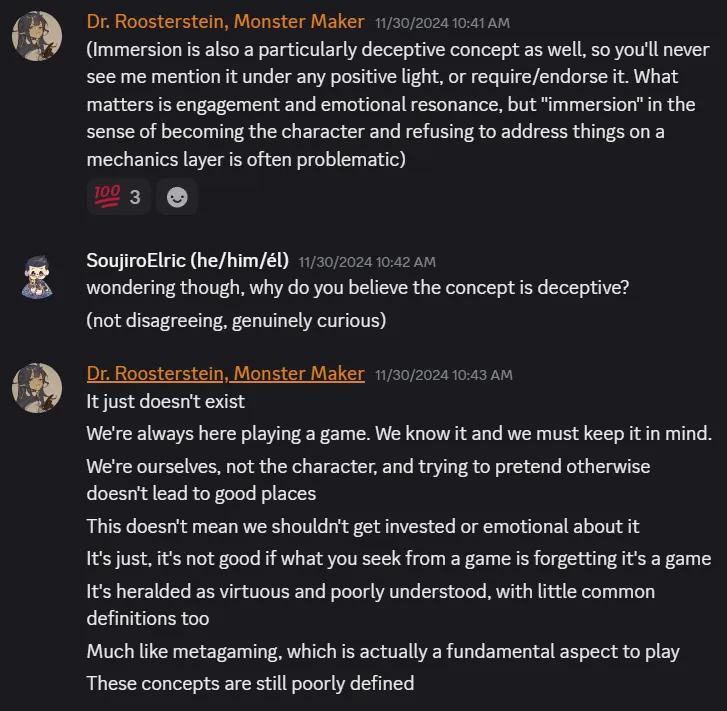
More than anything, Fabula points are a tool my players used to instantly solve problems.
- Need a mount? Found.
- Lost in the woods? You’re now rescued.
- Need to escape Albunduun, the Labyrinthian Sauna? There’s the secret passage out.
On one hand, you’d be right to label this as players being irresponsible with the power to ruin their own experience. Nothing was stopping them from using those points to create hilarious Zelda NPCs instead. On the other hand, I sympathize with players who’d prefer to abdicate that authority entirely. Brennan’s famous water analogy is instructive here.
This is, by far, the toughest uncracked nut. Truth be told, I'm not fundamentally opposed to non-diegetic mechanics, or to mid-game player construction of the setting. Collaborative worldbuilding is great! But once we're in-game, I don't want players to relieve tension non-diegetically - I want them to lock in. Not to satisfy some misplaced macho notion of testing player skill, but to ensure that the solutions to your player's problems always require engagement with the imagined space.
I want Fabula points to only impact the 'grey areas' normally filled by randomized procedures and on-the-spot improv, so that the steel bones of my prep can give the setting real stakes.
I'm open to suggestions.6
The Monsters are Hard to Improvise
Despite the players' ability to introduce major plot twists at will, basic NPC design is presented as an eight step process. Bosses take an hour each to construct by the book. The NPC creation rules occupy two panels on the official GM screen.
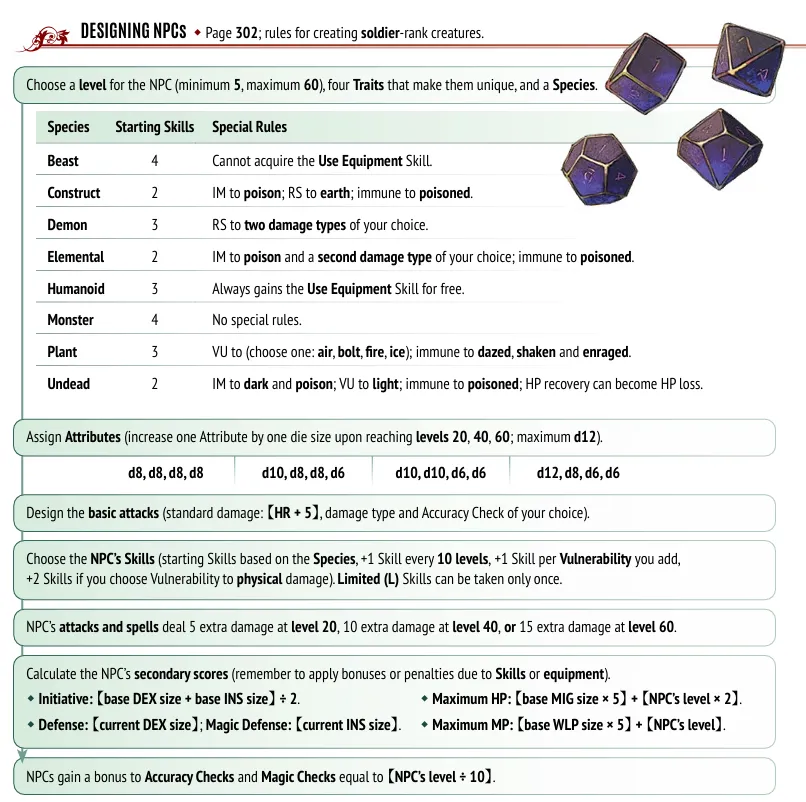
This is one area where Ema agrees there's a problem, and it's been alleviated considerably since release. IMO the system is unplayable without the Quick Assembly rules posted to her patreon, which are slated for full release along with the currently kickstarting Bestiary Vol 1. They're simple and great; every Fabula GM should use them.
The Atlases are Inspiration Fodder, not Adventures
The narrative control Fabula Points give players and Ema's personal design commitments to collaborative worldbuilding and Quantum Ogres means no premade adventures exist for the system.7 The Atlas expansion books are vehicles for expanded character building options, elaborate premade puzzle bosses, and... let's call it thematic inspiration?
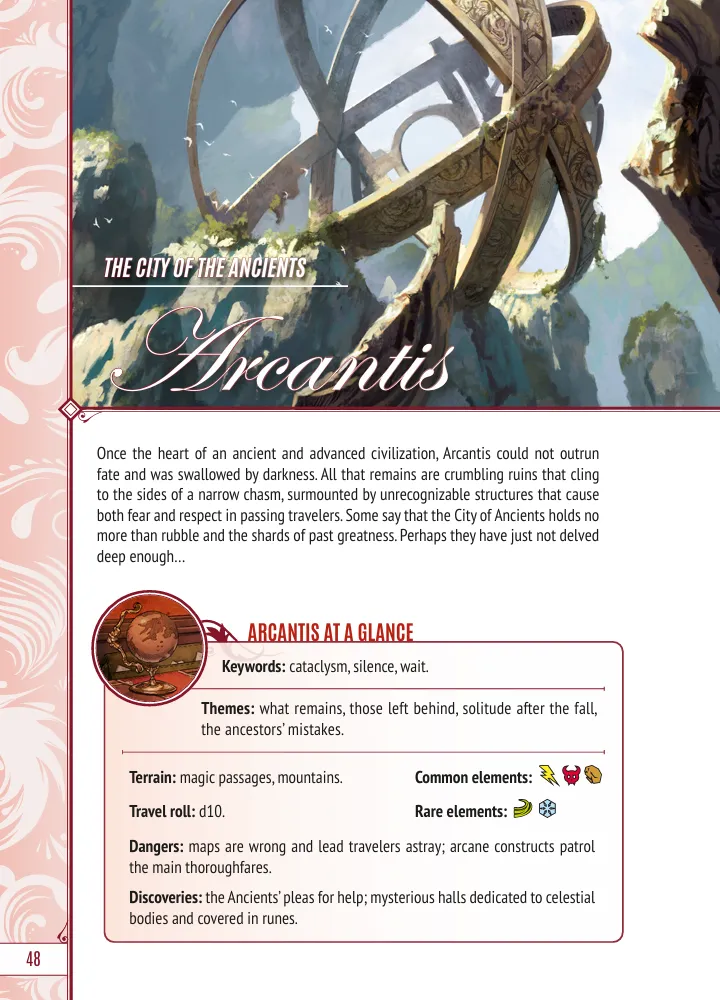
Instead of prepped concrete locations, the books detail a 'stereotype collage' of suggested locations, story beats, hooks, and secrets unmoored from any particular JRPG canon. A few people I know love these books so YMMV, but I personally do not find vague summary descriptions of other people's art inspirational. I find art inspirational. Devoid of any emotional context, these books read to me like... well... atlases. They bore me.
Attempting to crash course the reader, seminar-style, on the JRPG TV Tropes page cannot substitute for firsthand experience when the game expects you to pull from these themes to create compelling scenes on the spot. That requires love and mastery. In its absence, it's hard to imagine my creative output rising above weeb flavored AI slop.
Thank god that I genuinely love cringey JRPG melodrama.
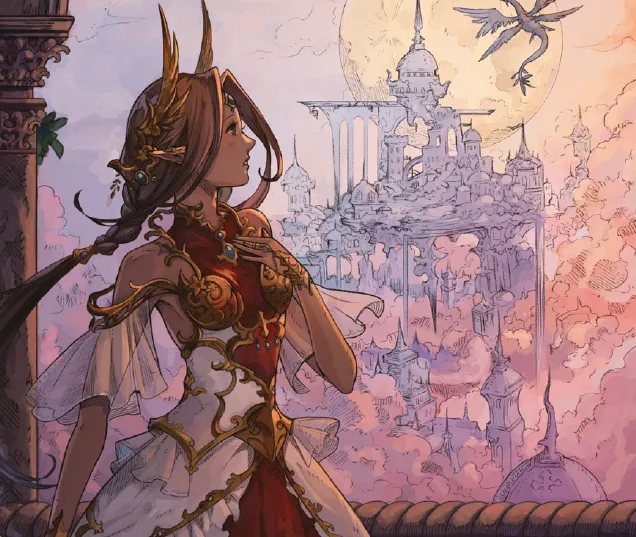
I Will Never Give Up on You
I think Ema overstates the extent to which her system depends on quantum improv. Excised of Fabula Points - an admittedly major surgery - these books are an unusually collaborative neotrad toolbox. I suspect that's a major component behind their success; even though I too would prefer innovative storygames rake in cash on their own merits.
However, I also think my perspective is biased by a player pool raised on seven years of West Marches games. If my party had truly appreciated the trust this system placed in them, would I be singing Fabula's praises instead?
I refuse to let that uncertainty stand. I'm going to keep playing this achingly sincere game - sometimes by its rules and sometimes by mine - until I learn the answer. Until that time, I'll be happy to play villain to a designer who's earned her celebration.
$18 Digital, $53 for the KS-exclusive Amano-art Hardcover you should buy instead of the softcover.
$465 for deluxe printings of the Core Rules, the Bestiary, all three Atlases, an Art Book, a quickstart scenario, character sheets, some rule expansion booklets, four sets of dice, dry-erase initiative and clock trackers, acrylic tokens, a deck of item cards, a GM screen, some digital bullshit you'll never use, an Amano art print, and a pretty box.
————————————————————————————
Ema’s on the record as being completely perplexed by the game’s critical and commercial success - her rebellious anti-trad project that hit it big because “it’s cheap and moryo made a great cover”. It’s our fault for seeing a crunchy character builder and crying “neotrad!”, not hers. She’s worn the game’s mission on her sleeve.↩
To the GMs reading this who worry whether their combat set piece is ‘cool enough’, I implore you to look at the actual, in-game mechanics of classic JRPG bosses. 90% of the time, they’re just AoE DPS factories, and a younger version of yourself loved it. Reskinning a bear really is good enough most of the time.↩
In short - when you hit zero hp, the player chooses whether to stay alive and let the DM take a “hard move”, in PbtA parlance, or accept their death in exchange for one final, heroic act.↩
Fully prepared to be roasted for this take. I could go on about why I prefer Fabula to BREAK!! systemically - the ways in which the later entrenches OSR tropes I want the NSR to move away from - but this post is long enough already. Another time, loves.↩
Both Fab and Ult points also have fiddlier check-buffing and restorations uses irrelevant to present discussion.↩
Rocky ideas I've floated include: #1 reframing Ultima points as a Daggerheart-style GM 'nega currency' generated by Fab point expenditures, #2 negating Fabula Point spends that contradict prep and requiring the GM - at that moment - to show diegetically why the contradiction exists, in a cutaway GM scene if necessary (Salvage Union has me bullish on 'information gathering' abilities right now), #3 making Fab point spends negotiated like Cypher Player intrusions - allowing the whole party to get +1xp that session instead of the requested plot twist when the GM rejects it, for example.↩
While editing this piece, Need Games announced a new compromise between Ema's vision and the realities of indie TTRPG production - "Ready-made campaign frameworks" tentatively called "Fabula Adventures". I am confused and interested.↩